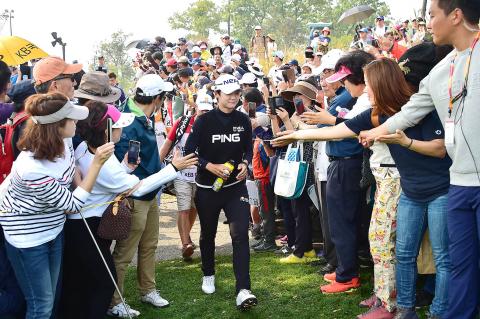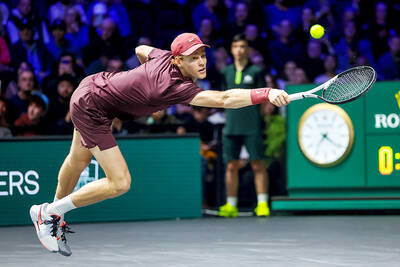Other golfers beware. With an ultra-competitive domestic tour and a seemingly limitless supply of young, talented players willing to sacrifice everything for success, South Korea’s dominance of world women’s golf is not going away — and if anything, it could get even stronger.
For years now, rivals have watched in wonder as a succession of South Korean players with immaculate techniques and nerves of steel have lifted trophy after trophy, including five of the past 10 major championships.
Among the world’s current top 10, six are South Korean, including world No. 2 Inbee Park. World No. 1 is New Zealand’s Lydia Ko, who was born in South Korea.

Photo: AFP
Nine of the top 20 are also South Korean and out of the 30 LPGA events contested so far this year, South Korean golfers have won 14 — two of them playing in their rookie season.
Theories abound as to why South Korean women are so dominant and include vague mumblings about “sensitive fingers” — a real or imagined physical trait also cited when discussing their success in archery.
More considered opinions cite a combination of cultural forces: a strong work ethic, driven parental support and a grinding education system that encourages the sort of repetitive, focused effort that suits the quest for golfing perfection.
However, Korean LPGA (KLPGA) executive vice chairman Kang Choon-ja believes the real answer lies in a top-quality domestic tour, which allows players to begin their international careers almost fully formed.
The prominence of South Korean women on the world stage is down to “the continued emergence of star players ... through an extremely competitive domestic tour structure that gives them experience of top-class tournament play,” Kang said.
South Korea’s rise as a golfing power dates from the 1998 US Open victory of Pak Se-ri — then 20 years old and in her rookie LPGA season.
She was the first South Korean — indeed, the first Asian — to win the oldest women’s major, and became the poster girl for a South Korean golfing boom that has gone from strength to strength.
Pak won Rookie of the Year in 1998, and seven other South Korean women have emulated her since then. The same number have won US Open titles, including this year’s victor Chun In-gee.
“Their work ethic, fundamentals, techniques are amazing,” US women’s golf legend Juli Inkster told reporters when she was in South Korea for the recent LPGA KEB Hana Bank Championship.
“What I love about Korea, is the way the people, the players, they have so much respect for women’s golf,” Inkster said.
From just a few hundred in the 1990s, the number of full professionals, semi-professionals and teaching professionals has exploded to more than 2,000, and the KLPGA has developed a three-tier tour system to try to meet the demand.
The Jump Tour has 16 events for fledgling players, while the Dream Tour for more advanced players boasts 20 tournaments. Finally, there are the 29 first-class events on the full-fledged KLPGA tour.
Total prize money for the latter currently stands at 18.5 billion won (US$16.3 million), up from 2 billion won in 1996 and nearly twice the 10 billion won available on the domestic men’s tour.
“The lower-tier tours are a great opportunity for players to improve their skill sets and get the early, practical experience of tournament play that will set them up for the future,” Kang said.
The players coming through the system certainly do not lack confidence.
“Top KLPGA players are good enough to lift an LGPA trophy any time,” said Park Sung-hyun, a star in the making, who has won three domestic tour titles so far this year.
Like many players of her generation, Park Sung-hyun started early, picking up her first club at the age of eight and embarking on a strenuous training program backed by her parents.
“It was my mom who got me into it. At that time Pak Se-ri was on TV a lot. So I really started out as one of the ‘Se-ri kids,’” the 22-year-old said.
“I practiced from dawn to dusk for up to eight hours almost every day,” she added.
Further back down the line are the likes of 13-year-old Sophia Lee, who only started playing in January, but is already enrolled in a top after-school golf academy that puts her through a strenuous daily program from 3pm to 9:30pm.
“After golf practice, I work out a lot in the gym, especially on strengthening my core. It is a tough workout,” the teenager said.
Such academies do not come cheap, but South Korean parents are used to the idea of dedicating a whopping chunk of their income to extra tuition, whether it be evening cram schools or specialist training.
The return on investment can be huge if one’s daughter breaks through into the big time.
“Women’s golf is one of the most popular sports here in terms of fandom and corporate sponsorships,” veteran golf columnist Kim Maeng-ryung said.
Players are starting earlier than ever and, with the right financial support, the training and facilities they can access is second to none.
“[However], the competition to become just a regular KLPGA player is absolutely cut-throat,” Kim said.

US President Donald Trump’s granddaughter, Kai Trump, is poised to make her LPGA Tour debut after receiving a sponsor invitation on Tuesday to the Nov. 13 to 16 tournament at Pelican Golf Club in Florida. “My dream has been to compete with the best in the world on the LPGA Tour,” Kai Trump said in a statement posted on the LPGA’s Web site. “This event will be an incredible experience,” she said. “I look forward [to] meeting and competing against so many of my heroes and mentors in golf as I make my LPGA Tour debut.” The 18-year-old high-school senior,

REACTION: Less than 24 hours after a 18-inning Game 3 loss, the Blue Jays’ win ensured that the best-of-seven series is to head back to Toronto for Game 6 tomorrow Vladimir Guerrero Jr on Tuesday blasted a two-run home run as the Toronto Blue Jays bounced back to defeat the Los Angeles Dodgers 6-2 and tie the MLB World Series at two games apiece. Less than 24 hours after a shattering 18-inning Game 3 loss, the Blue Jays climbed off the canvas to breathe new life into their hopes of a first MLB title in 32 years. Guerrero’s two-run blast off Dodgers starter Shohei Ohtani and a superb pitching performance from ace Shane Bieber laid the foundations for a gutsy victory that silenced Dodger Stadium. “I’m always trying to compete

Jannik Sinner on Thursday eased past Francisco Cerundolo 7-5, 6-1 at the Paris Masters to set up a quarter-final clash with Ben Shelton, while reigning champion Alexander Zverev earned a straight-sets win over Alejandro Davidovich Fokina in the third round. A maiden crown in the French capital would return Sinner to No. 1 in the world rankings after current incumbent Carlos Alcaraz suffered a shock early exit at the hands of Britain’s Cameron Norrie. The Italian four-time Grand Slam champion is yet to drop a set in the tournament as he hones in on what would be a fifth title of the

Retired defender Jerome Boateng on Saturday pulled out of a planned coaching internship at Bayern Munich after fans voiced their objection due to the FIFA 2014 World Cup winner being found guilty of assaulting a former girlfriend last year. The former Bayern and Germany defender, who played for the club between 2011 and 2021, had discussed a short internship with coach Vincent Kompany. “Following the recent discussion regarding myself, I have decided to focus on my issues such as the A training license.... That is where my focus is,” he said in a social media post addressed to Bayern and